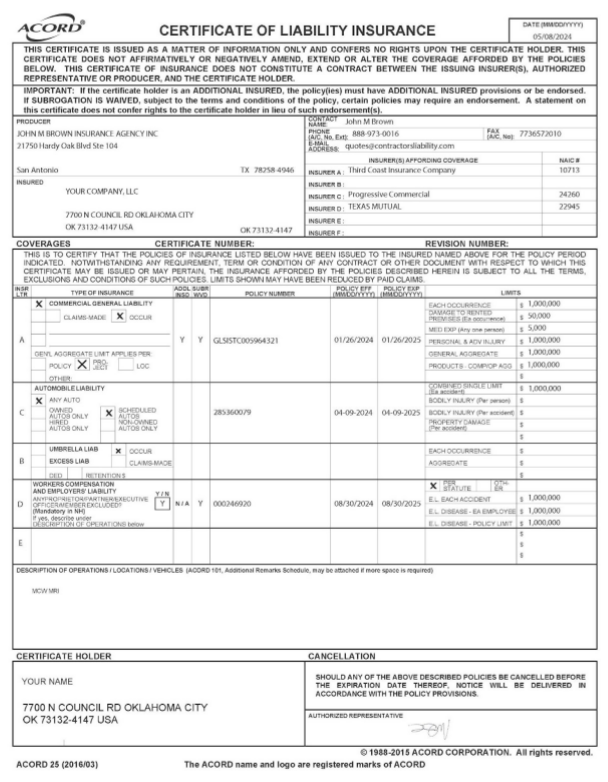“Build Smart, Build Legal: Key Steps to Contractor Licensing in Oklahoma”
If you’re planning to work as a general contractor in Oklahoma, securing the proper license is crucial for legal compliance and building trust with your clients. Unlike some states, Oklahoma has specific requirements depending on the type of contracting work you plan to do, such as electrical, plumbing, or HVAC services. The Oklahoma Construction Industries Board (CIB) oversees most contractor licensing in the state. Here’s a step-by-step guide to obtaining your contractor license in Oklahoma.
Steps to Obtain a Contractor License in Oklahoma by Type

General Contractors
- License Requirement: No state-level license is required, but local jurisdictions may have their own licensing requirements. Very Important.
- Application Fee: Varies by city/county.
- Exam Requirement: Generally, no state-administered exam is required, but local exams may apply.

Electricians
- License Requirement: A state-issued license is mandatory for any electrical work.
- Application Fee: $75 (Journeyman), $150 (Contractor).
- Exam Requirement: Must pass the Oklahoma Electrical Contractor Exam, covering the National Electrical Code (NEC) and state-specific regulations.

Plumbers
- License Requirement: State license is required and regulated Oklahoma Department of Health (OSDH).
- Application Fee: $75 (Journeyman), $150 (Contractor).
- Exam Requirement: Must pass the Oklahoma Plumbing Contractor Exam, which includes plumbing codes, installation practices, and safety standards.

HVAC Contractors
- License Requirement: Must obtain a license to perform heating, ventilation, and air conditioning (CIB).
- Application Fee: $75 (Journeyman), $150 (Contractor).
- Exam Requirement: Must pass a state exam that covers technical knowledge, installation practices, and safety protocols related to HVAC systems.

Roofers
- License Requirement: Requires state registration under the Oklahoma Roofing Contractor Registration Act.
- Application Fee: $75.
- Exam Requirement: Depending on local jurisdiction requirements, one may need to pass an exam.
Submit Your License Application
After passing the required exams, you must submit a completed application to the appropriate licensing board, such as the Oklahoma Construction Industries Board (CIB) or the Oklahoma State Department of Health (OSDH), depending on your trade. The application process generally includes:
- Application Form: Complete with your details, work history, and any required documentation, such as proof of experience or educational qualifications.
- Application Fee: Pay the required fee, which varies depending on the type of license.
- Proof of Insurance: Many trades, particularly those involving public safety, require proof of general liability insurance.
- Complete the Oklahoma business registration packet: If you are a nonresident contractor.
- Register with the Oklahoma Tax Commission: For tax compliance.
Obtain Liability Insurance for Contractors
Oklahoma requires contractors to carry liability insurance to protect both the contractor and their clients in case of accidents, damages, or injuries on the job. The required coverage can vary depending on the trade and specific construction services. General construction services may have different insurance requirements, including remodeling and repairs.

General Liability Insurance
Covers property damage, bodily injury, and personal injury caused by your business operations. This insurance also covers work related to residential and municipal utilities.

Workers’ Compensation Insurance
If you have employees, Oklahoma law requires you to carry workers’ compensation insurance to cover any injuries or illnesses that occur on the job.
Cost of Surety Bonds
The cost of a surety bond is typically a percentage of the bond amount, usually ranging from 1% to 5% annually. The exact percentage depends on factors such as the contractor’s creditworthiness, financial stability, and the size of the bond required.
- Typical Cost: For a bond amount ranging from $10,000 to $50,000, the annual premium could be between $100 and $2,500, depending on the contractor’s financial profile.
Insurance Requirements and Costs for Oklahoma Contractors
| Insurance Type | Coverage | Typical Coverage Limits | Estimated Annual/Cost |
|---|---|---|---|
| General Liability Insurance | Property damage, bodily injury, personal injury | $500K – $1M per occurrence | $700 – $2,5K |
| Workers’ Compensation Insurance | Employee medical expenses, lost wages | Varies by payroll and risk | $2K – $7.5K |
| Commercial Auto Insurance | Business vehicle liability, damage | Varies by vehicle type/use | $1K – $3.5K per vehicle |
| Professional Liability Insurance | Negligence, errors, omissions | Varies by services/limits | $800 – $3.5K |
| Surety Bonds | Contractual obligations | $10K – $50K bond amount | 1% – 5% of bond ($100 – $2.5K) |
See the Official Document:

Keep Your License Active
Once you have obtained your contractor’s license, it’s essential to keep it active by renewing it as required. Local city regulations may also require additional permits or renewals. Most licenses need to be renewed every one to two years, depending on the trade. Oklahoma general contractors must stay updated with both state and local requirements to maintain their licenses. Renewal usually involves:
- Continuing Education: Many trades require ongoing education to stay current with technological changes, codes, and safety standards.
- Renewal Fees: Pay the renewal fee to maintain your license in good standing.
- Updated Insurance: Ensure that your liability insurance remains current and meets the state’s requirements.
Frequently Asked Questions (FAQ)
These are common questions about General Contractor License in Oklahoma.
No, Oklahoma does not require a state-level license for general contractors. However, some cities and counties may have their own licensing requirements, so check with your local jurisdiction.
You must have several years of experience as a licensed journeyman electrician. In some cases, you may also need to complete a state-approved training program.
To become a licensed HVAC contractor, you must complete an apprenticeship program, gain years of on-the-job experience, and pass a state exam covering HVAC systems, installation practices, and safety protocols.
Yes, plumbing contractors must pass the Oklahoma Plumbing Contractor Exam, which tests knowledge of plumbing codes, installation practices, and safety standards.
Yes, roofing contractors must register with the state under the Oklahoma Roofing Contractor Registration Act. Proof of experience and insurance is required, and some local jurisdictions may require an exam.
The type of license you need depends on the specific work you plan to perform, such as electrical, plumbing, HVAC, or roofing. Check with the Oklahoma Construction Industries Board (CIB) or local authorities to determine the correct license for your trade.

